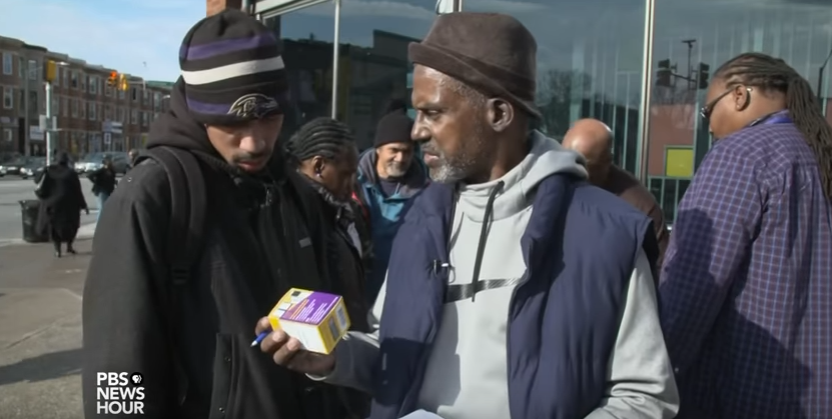
JUDY WOODRUFF: But first: the nation’s opioid crisis.
Overdose deaths are on the rise across the country, in 2015, surpassing gun homicides for the first time. One of the hardest-hit states is Maryland, where the governor today declared a state of emergency to fight the epidemic.
But, for more than a year, the city of Baltimore has been training everyday citizens in how to use a lifesaving antidote, an approach that’s catching on across the country.
NewsHour producer Pamela Kirkland visited Baltimore to find out more.
MAN: Excuse me, sir, are you interested in Narcan training?
PAMELA KIRKLAND: Each week, city health workers hit the streets of Baltimore, handing out an emergency medication that brings users back from the dead.
JOHN HARRIS, Baltimore Health Department: This is the medicine. It reverses overdoses.
PAMELA KIRKLAND: Naloxone, brand name Narcan, comes as a nasal spray or injection, and works by blocking the brain’s opioid receptors.
In a city with 24,000 active heroin users, overdoses, and now increasingly this emergency antidote have become facts of life.
KYRON BANTON, Baltimore Resident: I lost a friend of mine that was — at 25 years old.
KENNETH SADIQ LEIGHTON, Baltimore Resident: I have just seen so many young people getting hooked on the opioids, or better yet, the fentanyl. And it’s definitely a killer.
PAMELA KIRKLAND: In Maryland, deaths from opioids, which include heroin, fentanyl and prescription painkillers, doubled between 2010 and 2015, to just under 1,100 people a year. Meanwhile, heroin fatalities alone more than tripled.
And in just the past three years, deaths in Baltimore from fentanyl, a synthetic opioid far stronger than heroin, are up 20-fold.
DR. LEANA WEN, Baltimore Health Commissioner: We have an epidemic of people, fellow residents in our city, who are dying from opioid overdose.
Read the transcript or watch the entire video.